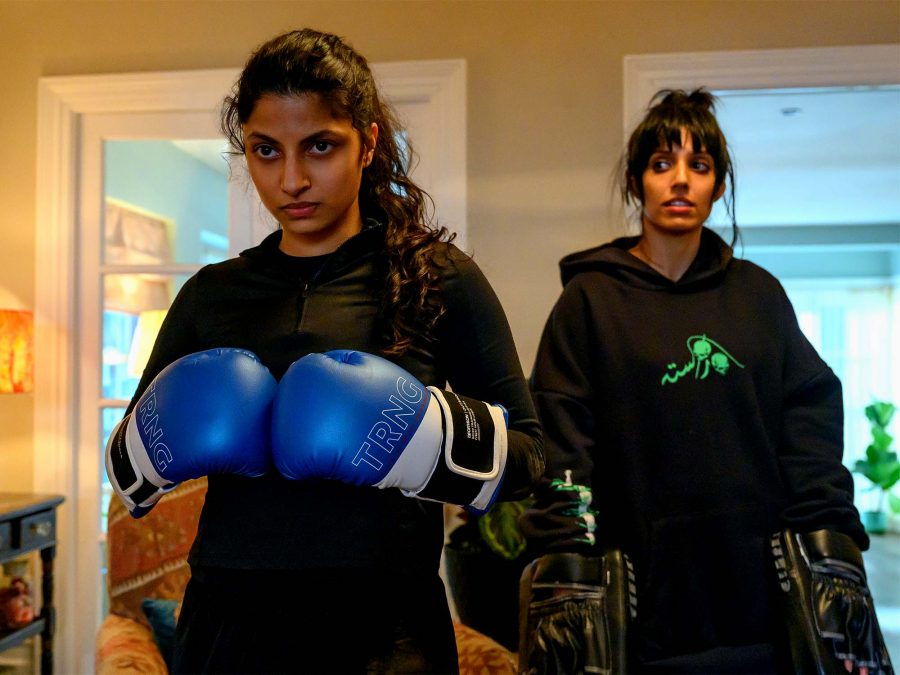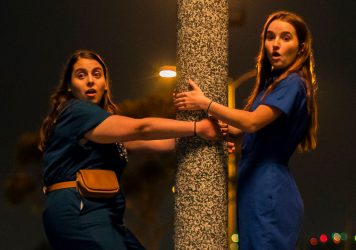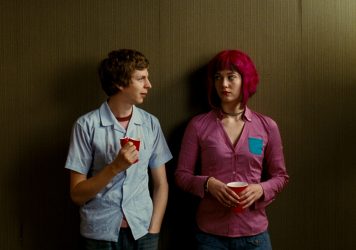Following the blast of sitcom joy that was We Are Lady Parts, Nida Manzoor takes a giant leap to the big screen with an in-your-face comedy about crane-kicking the face of traditional mores.
‘Polite society’ is a turn of phrase that came to prominence in the late 1700s, epitomising haughty upper-class judgement that deemed certain behaviour to be unbecoming. As the title of Nida Manzoor’s completely delightful debut feature, the writer/director co-opts this atmosphere of Regency-era snobbery to represent modern Pakistani society as governed by an unofficial council of disapproving “aunties” – an adversary that assumes many guises for her action heroine to bring down.
“When I’m older, I’m going to be a stuntwoman.” Karate-chopping her way onto a big screen near you is the irrepressible protagonist of Polite Society, who likes to remind anyone who will listen about her destiny, regardless of their interest or, in the case of her teachers and parents, lack of enthusiasm. Ria Khan (Priya Kansara) bulldozes through life with her ambitions front-and-centre, and her only hypewoman on the home front is her big sister Lena (Ritu Arya) who is, when we meet her, slumped in the doldrums of depression having just dropped out of art school.
Though she has to be wrestled out of bed, Lena is ready to get behind the smartphone and film all the latest sick moves for her sis’ YouTube channel while yelling out encouragement. Mirroring Lena’s moral support, Ria is determined that her older sibling will overcome her self-doubt and become a radical new creative. Empowered by each other’s rebellion, the sisters represent the new front of Muslim women, coming together to support each other’s dreams in the face of intergenerational scorn.
This solidarity faces its greatest test in the form of Salim (Akhshay Khanna) who, like the classic Pakistani dreamboat, is a promising young doctor looking for marriage. He filters girls not through Tinder but instead under the overbearing, forensic gaze of his mother, Raheela (Nimra Bucha). Salim meets Lena at an Eid party, sorry, “soiree”, thrown by Raheela, and the pair quickly take a shine to each other. This encounter sets Lena on a path to wealth and housewifery – all to Ria’s utter horror.
Lena just wants safety and security and, in this economy, it is truly hard out here to be a girl, standing in front of a boy. But, she’s clearly been caught at a moment of self-doubt and it is up to Ria to rescue her from the villain of patriarchal submission.
Though Ria clearly misunderstands the author when she yells at her sister, “Don’t do a Jane Austen, and throw it all away for a man!”, the reference is perhaps more apt to her. Ria goes through an almost reverse ‘Northanger Abbey’, gaslit into assuming her paranoia about Salim and his family is unwarranted, when, as the trends in much recent cinema are keen to tell us, from the heights of Parasite to the lows of The Menu, rich people do be crazy.

Kansara manages to pull off incredibly earnest and expressive adolescent frustration, even if the same cannot quite be said of her besties Alba (Ella Bruccoleri) and Clara (Seraphina Beh), actresses slightly too old and built to fit the garish red uniform of Ria’s girls’ school. However, it’s clear that the cast are having an absolute ball reliving the life and death melodramas of adolescence, with Manzoor’s script unabashedly embracing the cringe-y, obnoxious and the rude.
From a formal vantage, the fast-paced editing and hilarious zooms contribute to a sense of amusing anarchy, and as the graphic-novel-esque chapters unfold, Priya levels up like a classic video game character. From the small fry enemy of school bully Kovaks (Shona Babayemi) to final bosses, The Wifehunter and the Mother-in-Law, the epic fight scenes scale up as Ria hones her skills and the stakes get higher.
Though Nimra Bucha is fairly new to Western screens, following up her villain arc in the 2022 TV series, Ms. Marvel, she’s quickly carving out a niche for herself as the epitome of the classic Pakistani archetype of evil Mother-in-Law. Her deep voice, arch personality and cheekbones ready to cut unsuspecting future daughters are perfectly utilised here, with the poise to back up her dangerous Kung-Fu moves. She subverts aspects of brown girl womanhood to make them terrifying, tying up Ria in a pacheri and torturing her, Bond-villain-style, with waxing. As the wedding events progress, Ria must embrace an all-dancing, salwar kameez-wearing act in a showdown of Edgar Wright action-comedy proportions.
Director Nida Manzoor critiques how South Asian parents prioritise “a good match” over the personal ambitions of their children. Even Ria and Lena’s mother Fatima (Shobu Kapoor) reiterates that she “let Lena do the art school thing,” seeing herself as progressive but with limitations. It is an intriguing middle ground for Kapoor, on one side, her role as Lady Sheffield in Bridgerton, who disowns any non-nobility in her family, to the other end of the spectrum, the embarrassingly eager mother in Manzoor’s TV sitcom We Are Lady Parts, only too ready to embrace her daughter’s new punk-rock era.
In Polite Society, another hurdle for Ria to overcome is Fatima’s need to fit into her community. She doesn’t see how stuntwomanship is a career (although to be fair, neither do the Oscars) and sees the arts as fruitless pursuit without stability. It is a tale too true for young Asians, even Manzoor’s parents originally wanted her to become a lawyer instead of a filmmaker. This sentiment of connecting your parents with your passion rather than driving them away can be seen in Gurinder Chadha’s filmography, and outside of this community, in Spielberg’s glorious The Fabelmans. There is a distinctive void of a YA love interest here, and instead Ria’s arc focuses not just on her sisterly affection, but her unbridled pursuit for stuntwoman success.
With yellow cursive announcing each new chapter, the titles boldly translated into Urdu and Hindi, and in allowing Kansara to do as many of her own stunts as possible, Nida Manzoor gives brown girls their kung-fu action-comedy moment. Unafraid to embrace the kooky and absurd notions that Ria manifests into her life, Polite Society follows up We Are Lady Parts to showcase the fresh and funny humour Manzoor has to offer British comedy.
Little White Lies is committed to championing great movies and the talented people who make them.
Published 25 Apr 2023
We Are Lady Parts is top-tier television and the dazzling trailer made this one of my most anticipated films of the year.
South Asian Scott Pilgrim energy that is heaps of fun.
Martial arts combatting marital annihilation makes for a winning combination.

As a Desi girl coming of age in the early 2000s, Gurinder Chadha’s film has a profound impact on me.

Beanie Feldstein and Kaitlyn Dever shine in a Superbad-esque high school comedy to savour.

Although Scott Pilgrim is a hyperactive feast, its greatest strength is its studied literalism.